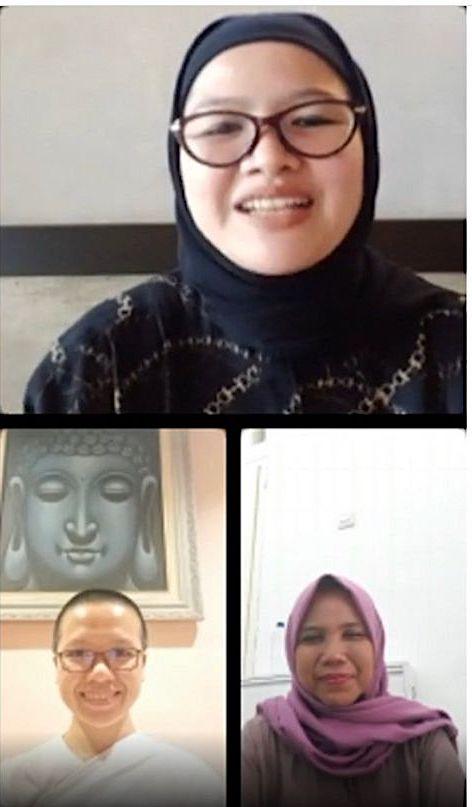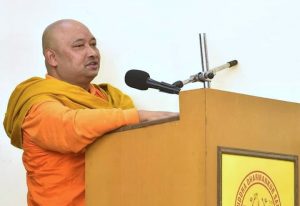The Young Buddhist Association of Indonesia (YBA) recently organized an interfaith dialogue on women and spirituality, titled “Full Humanity of Women,” from the perspective of the religious traditions of Buddhism and Islam.
The event was organized in cooperation the religious educational program Pendidikan Studi Agama and hosted by the program founder’s, scholar Tri Indah Annisa.
The Young Buddhist Association of Indonesia (YBA) is the leading Buddhist youth organization in Indonesia. Through a deeply held conviction in the Buddha’s message of compassion, growth, and liberation, the association promotes a positive lifestyle among the young to develop a society founded on wisdom, compassion, and gratitude. The association is involved in establishing Buddhist organizations nationwide, propagating the study of the Dharma among young people, and providing leadership training.

Representing the Buddhist perspective, the Theravada nun Atthasilani Gunanandini explained that during the time of the Buddha, a period when societies were inherently patriarchal, women were generally confined to a secondary role within their communities. However, she noted, the Buddhist perspective during the same period differed markedly from prevailing social norms, viewing women as equally capable as men of becoming fully realized spiritual beings.
“According to the Buddha, while there are biological differences between women and men, their roles and positions in life are no different,” Atthasilani Gunanandini observed. “This was proven during the Buddha’s lifetime, and in fact the Buddha helped to raise and equalize the social and spiritual statuses of woman based on the understanding that women have the same intellectual and spiritual capacities as men.”
She went on to expand that the Buddha had advocated two kinds of livelihood: the first for those who wish to live as householders and have families; and the second for those whose intention is to leave behind the life of the householder to follow the highest of spiritual aspirations, which meant that there is no difference between men and women.
“Even today, within Buddhist communities, women have the flexibility and freedom to choose their role in life, and to develop their potential to be what they want to be, and to pursue the kind of work they want,” said Atthasilani Gunanandini. “The goal is that women have the freedom to develop themselves because women are positioned as whole human beings in the context of the Buddhist teachings.”
Meanwhile, the Muslim perspective was presented by the Islamic scholar Dr. Nur Rofiah, who explained that Islam also emphasizes that women are human, and thus any act that is inhumane toward women goes against Islam. As such, she said, women should not be considered servants of men, because before God, men and women are equal in that they are both servants of God.
“Well, the general meaning of Islam is total submission to God,” Dr. Nur Rofiah noted. “Islam is a continuous process of proving one’s submission only to God by acting in harmony with all of His creation—including women.”
Dr. Nur Rofiah noted that the full humanity of women is manifested by ensuring that the biological experiences of women do not worsen, and through ensuring that social vulnerability to inhuman acts and all forms abuse never occur: “This is a prerequisite for how we place and respect women within the complete system of life.”
She added that it is essential to realize that life is a process, and that manifesting true justice is also a long process.
“Yet the most important factor is self-awareness, and consciously playing an active role to be the best version of yourself in all circumstances,” said Dr. Nur Rofiah. “Fundamentally, I benefit because I exist. I hope that all women in Indonesia are truly recognized for their complete humanity.”

Speaking at the conclusion of the dialogue, the vice-chairman of the YBA, Limanyono Tanto, emphasized that it was important for more such interfaith dialogues to be held, to enable young Indonesians to know and understand each other across cultural and religious traditions, and to nurture moderation and tolerance between religious communities.
“From here, we hope that a sense of brotherhood and a sense of caring for each other as brothers and sisters and as human beings can be created in our communities,” said Limanyono Tanto. “We young Buddhists . . . can learn also from other religious leaders, that is, all religions agree to respect women and, in essence, we all share the same passion to be empower women to live happy lives.”
Although officially a secular state, Indonesia is home to a diversity of communities and religious and spiritual traditions. Islam is the most widespread religion, observed by 86.7 per cent of the population, according to national data for 2018. Christian traditions account for a combined 10.7 per cent, Hinduism 1.7 per cent, and Confucianism, folk, and other traditions account for a combined 0.08 per cent.
Buddhism, practiced by 0.8 per cent of the population—roughly two million people—is the second oldest spiritual tradition in Indonesia after Hinduism. According to historical accounts, Buddhism first flourished on the archipelago around the sixth century, which was followed by ascent and decline of a number of powerful Buddhist empires, including the Shailendra dynasty (c. 8th–9th centuries), the Srivijaya empire (c. 7th–12th centuries), and the Mataram empire (c. 8th–11th centuries). Today, the majority of Indonesian Buddhists are affiliated with Mahayana schools of Buddhism, although communities of Theravada and Vajrayana practitioners also exist.
See more
Young Buddhist Association of Indonesia
Young Buddhist Association (YBA) of Indonesia (Instagram)
Young Buddhist Association of Indonesia (Facebook)
studiagama.id (Instagram)
Related news reports from BDG
Young Buddhist Association of Indonesia Hosts National Workshop on Religious Moderation
Young Buddhist Association of Indonesia Holds “Mindful Festival 2022” to celebrate Kathina Tradition and Interfaith Harmony
Young Buddhist Associations of Indonesia and Malaysia Hold Online Forum on the Dangers of Radicalism and Extremism












